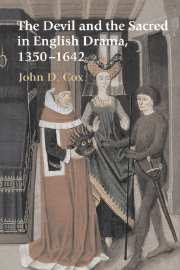Book contents
- Frontmatter
- Contents
- List of illustrations
- Acknowledgments
- Introduction
- 1 Stage devils and oppositional thinking
- 2 The devil and the sacred in the English mystery plays
- 3 Stage devils and sacramental community in non-cycle plays
- 4 Stage devils and early social satire
- 5 Protestant devils and the new community
- 6 The devils of Dr. Faustus
- 7 Reacting to Marlowe
- 8 The devil and the sacred on the Shakespearean stage: theatre and belief
- 9 Traditional morality and magical thinking
- 10 New directions
- Appendix. Devil plays in English, 1350–1642
- Notes
- Index
3 - Stage devils and sacramental community in non-cycle plays
Published online by Cambridge University Press: 22 September 2009
- Frontmatter
- Contents
- List of illustrations
- Acknowledgments
- Introduction
- 1 Stage devils and oppositional thinking
- 2 The devil and the sacred in the English mystery plays
- 3 Stage devils and sacramental community in non-cycle plays
- 4 Stage devils and early social satire
- 5 Protestant devils and the new community
- 6 The devils of Dr. Faustus
- 7 Reacting to Marlowe
- 8 The devil and the sacred on the Shakespearean stage: theatre and belief
- 9 Traditional morality and magical thinking
- 10 New directions
- Appendix. Devil plays in English, 1350–1642
- Notes
- Index
Summary
The devil's opposition to sacramental community makes sense in the mystery plays, which have increasingly been understood in light of the sacred social body. Other kinds of early drama, however, seem less indebted to a ritual conception of community. The fifteenth-century Play of the Sacrament, from Croxton, Norfolk, is an obvious exception, but neither morality plays nor saints' plays were associated with the eucharist or with Corpus Christi. Saints' plays were performed on saints' days; morality plays, at any time of the year; and neither seems to have involved the community in the same way the mystery plays did, since the life of a particular saint or of a representative abstraction did not offer, as dramatic subjects, the same scope for social cooperation and competition that was offered by the communal staging of salvation history, and neither seems to have involved anything like the Corpus Christi procession.
Yet the non-cycle plays were also oriented to the sacraments, as we shall see, and their distinction from the mystery plays is an accident of critical history rather than a feature of the plays themselves. This is particularly true where stage devils are concerned, for the evolutionary argument about devils as a comic dessert added to a serious doctrinal entrée is closely related to the way we have come to distinguish the mystery plays from other kinds of early drama.
- Type
- Chapter
- Information
- The Devil and the Sacred in English Drama, 1350–1642 , pp. 39 - 59Publisher: Cambridge University PressPrint publication year: 2000



